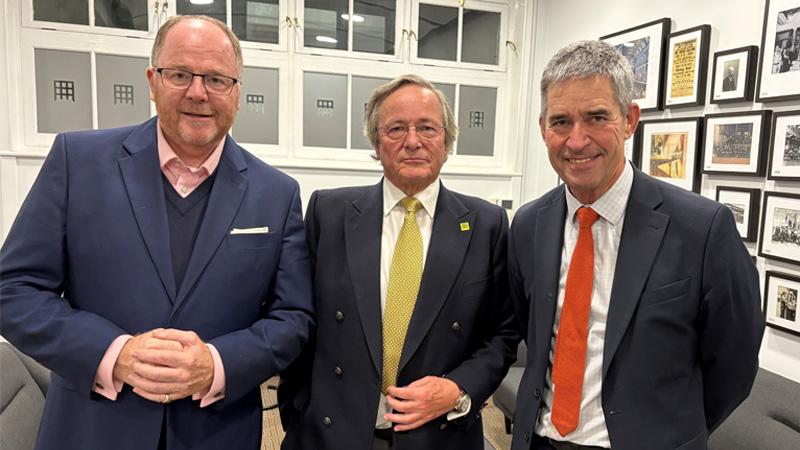The University of Westminster hosted Professor Geoffrey Guy and George Freeman MP to share research updates from The Guy Foundation Quantum Biology Lab. The lab is a joint initiative between the University of Westminster and the Harwell Science and Innovation Campus dedicated to advancing understanding of biological processes and innovating healthcare, which can also contribute to humanity’s understanding of space health.

On 10 October, Westminster welcomed guests from The Guy Foundation to share key research updates from The Guy Foundation Quantum Biology Lab. Visitors included foundation Co-founder and Trustee Professor Geoffrey Guy, and Advisor to the Board of Trustees, MP for Mid Norfolk George Freeman.
Established in 2018, the lab arose from and is supported by The Guy Foundation, a UK-based charitable organisation dedicated to advancing research on the role of quantum mechanics and thermodynamics in living systems, with the goal of informing new approaches to healthcare.
The lab is part of the Research Centre for Optimal Health at the University of Westminster’s School of Life Sciences and has partnered with the Harwell Science and Innovation Campus to advance understanding of the fundamental quantum and biophysical processes that underpin life.
The visit consisted of a series of presentations from Westminster colleagues to showcase their latest research in quantum biology and space health. During the presentations, Head of Group and Westminster Senior Research Fellow Dr Rhys Mould and Research Associates Grace Pennelli and Sanika Ghayal explored how cells communicate using light, an emerging frontier of science that sits at the intersection of physics, biology and medicine.
Thanks to ultra-sensitive photon-detection technologies developed through the lab, researchers can now detect the minute light emissions, called biophotons, produced by living cells. These subtle signals may reveal how cells exchange information and maintain internal order. The presentations also revealed new insights into how different wavelengths of light affect cellular function and human health, with potential applications in regenerative and preventive medicine.
To close the session, the team provided exciting updates from their space health research, including hypomagnetic-field experiments that simulate the weakened magnetic environments encountered in space. These studies are helping to uncover how fundamental biological systems respond and adapt when removed from Earth’s protective magnetic field.
About the lab’s research, Westminster’s Professor Jimmy Bell said: “The Guy Foundation Quantum Biology Lab unites unique expertise across Westminster and Harwell. By studying how cells use light to communicate and adapt to space travel conditions, we are beginning to reveal the quantum foundations of life and their potential to transform how we understand health and ageing.”
Professor Peter Bonfield, President and Vice-Chancellor of the University of Westminster, added: “It was a pleasure to attend this event and hear all about the incredible new research from Westminster colleagues at The Guy Foundation Quantum Biology Lab. Westminster’s partnership with Harwell to develop innovative medical technology underscores our university’s mission to contribute to a more sustainable, equitable and healthier society and work with others to make a difference to the world.”
Westminster’s work with The Guy Foundation directly contributes to the United Nations Sustainable Development Goals (SDG) 3: Good Health and Wellbeing, 9: Industry, Innovation and Infrastructure and 17: Partnerships for the Goals. Since 2019, the University of Westminster has used the SDGs holistically to frame strategic decisions to help students and colleagues fulfil their potential and contribute to a more sustainable, equitable and healthier society.
Learn more about Biological and Biomedical Sciences courses at the University of Westminster.
Find out more about research at the University of Westminster.


